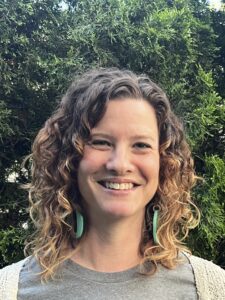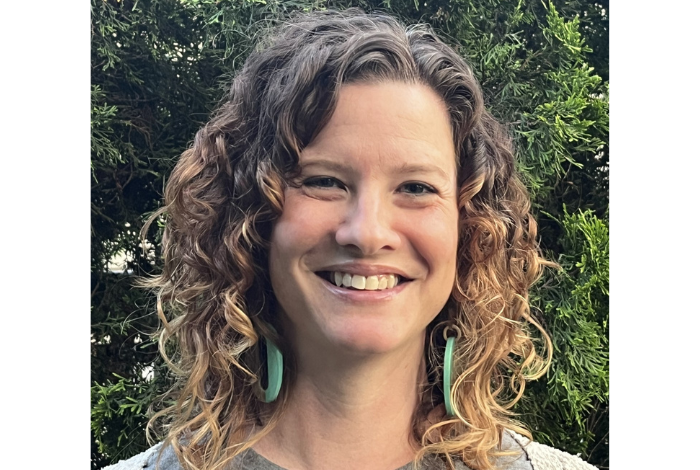Rachel Ringenberg Miller uses her own experience to offer ideas for raising the next generation of pastors from within the church.
 Rachel Ringenberg Miller Rachel serves as a denominational pastor in pastoral leadership for Mennonite Church USA. She focuses on conference and congregational engagement, providing resources and services to meet the diverse demands facing congregations today. She received her Master of Divinity degrees from Goshen (Indiana) College and Eastern Mennonite Theological Seminary in Harrisonburg, Virginia. She has served as Associate Pastor at Portland (Oregon) Mennonite Church and Pastor at Shalom Mennonite Church in Newton, Kansas. Rachel attends Eighth Street Mennonite Church, a congregation of the Central District Conference in Goshen, Indiana.
Rachel Ringenberg Miller Rachel serves as a denominational pastor in pastoral leadership for Mennonite Church USA. She focuses on conference and congregational engagement, providing resources and services to meet the diverse demands facing congregations today. She received her Master of Divinity degrees from Goshen (Indiana) College and Eastern Mennonite Theological Seminary in Harrisonburg, Virginia. She has served as Associate Pastor at Portland (Oregon) Mennonite Church and Pastor at Shalom Mennonite Church in Newton, Kansas. Rachel attends Eighth Street Mennonite Church, a congregation of the Central District Conference in Goshen, Indiana.
______________________________________________
I You may be asked questions such as: Where are the pastors? How long will it take for my church to find a pastor?1 What is the Mennonite Church USA doing to increase the number of pastors?
The last question is my favorite because it makes it sound like the pastor is rural, which couldn’t be further from the truth.
Your future pastor might be the squirming toddler sitting next to you in church, the shy, awkward teenager dominating the Bible quiz competition, the young adult who seems to get caught up in one thing after another, the middle-aged person who has always loved theology, or you.
Where are the pastors? They are already within your congregation. A better question might be, “What is my congregation doing to create space and opportunities for the development of leadership skills?” Creating space and opportunities does not mean that the church needs to find volunteers or create new programs for the current pastor to run. That is much easier than creating new programs. I will illustrate what I mean with an example from my experience. As teenagers, I and others in my youth group were regularly invited to participate in the life of the church. We led worship, helped with Bible school, performed in the annual intergenerational production of Amaal and the Night Visitors, attended church council meetings, and sang in the choir. Were we doing these things well? No, I don’t think we were. And yet, we were invited, encouraged, and most importantly, mentored by various people in the congregation.
My church saw itself as a teaching church, similar to a teaching hospital, where people are invited to test and develop their skills in a real-life environment. The church allowed us to try different things, and it was okay if we didn’t immediately excel at everything we tried. If we failed, the adults asked us to try again or try something else.
For example, I was once asked to be one of the dancers in Amahl and the Night Visitors because the choreographer wanted all the dancers to be the same height, and I fit the bill. But I’m not a graceful dancer. I’m sure the choreographer regretted that choice, but we got over it. So, have I ever been asked to dance again? No, I haven’t. But I have been asked to be in plays that don’t have dancing.
It was this openness to exploring my talents and skills that ultimately led me to feel a calling to the pastorate both externally and internally.
My story is not unique. There are several young people in my youth group who have worked in MC USA churches, agencies and facilities. But my youth group is not unique. When most pastors are asked how they got into the pastoral profession, they always say, “Someone in my congregation saw me doing something and said, ‘You should consider the pastorship.'”
What is MC USA doing to find pastors? The real question is, what are we, all of us at MC USA, doing to support, encourage, and invite people to consider church service? Developing pastors is something we do together, and it happens most often within the context of church service. Here are some ideas for churches to start supporting and encouraging people to consider service:
- We love the noise that babies, children and young people bring to worship services. The cries, loud slurps and whispers of babies mean that they and their parents feel safe worshipping with you.
- Encourage them to participate in worship services outside of “Youth Worship Sunday.” For example, if your congregation has a mentoring program, invite mentors and mentors to lead worship together, teach Sunday school, or facilitate a children’s storytime.
- We frequently discuss ways that youth and young adults can explore ministry, from attending worship services to formal programs like ministry exploration programs.And then I encourage them to do it.
- Include scholarships for both Mennonite non-degree and seminary degrees in your budget.
- Look out for adult missionary programs such as Journey, Instituto Bíblico Anabautista (IBA), and Seminario Bíblico Anabautista Hispano (SeBAH).
- Remember to be gracious when you make mistakes and celebrate when things go well.
The views and opinions expressed in this blog are those of the author and do not necessarily represent the views of the MC USA Executive Board or staff.
Want to submit a blog post to Menno Snapshots? Please see our blog guidelines here.

